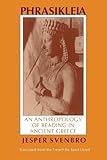Phrasikleia : An Anthropology of Reading in Ancient Greece / Jesper Svenbro.
Material type: TextSeries: Myth and PoeticsPublisher: Ithaca, NY : Cornell University Press, [2018]Copyright date: ©1993Description: 1 online resource (240 p.) : 1 illusContent type:
TextSeries: Myth and PoeticsPublisher: Ithaca, NY : Cornell University Press, [2018]Copyright date: ©1993Description: 1 online resource (240 p.) : 1 illusContent type: - 9781501717680
- 028/.9/0938 20
- Z1003.5.G8 .S9413 1993eb
- online - DeGruyter
| Item type | Current library | Call number | URL | Status | Notes | Barcode | |
|---|---|---|---|---|---|---|---|
 eBook
eBook
|
Biblioteca "Angelicum" Pont. Univ. S.Tommaso d'Aquino Nuvola online | online - DeGruyter (Browse shelf(Opens below)) | Online access | Not for loan (Accesso limitato) | Accesso per gli utenti autorizzati / Access for authorized users | (dgr)9781501717680 |
Frontmatter -- Contents -- Foreword -- Translations Consulted -- Introduction -- CHAPTER 1. Phrasikleia: From Silence to Sound -- CHAPTER 2. I Write, Therefore I Efface Myself: The Speech-Act in the Earliest Greek Inscriptions -- CHAPTER 3. The Reader and the Reading Voice: The Instrumental Status of Reading Aloud -- CHAPTER 4. The Child as Signifier: The "Inscription" of the Proper Name -- CHAPTER 5. The Writer's Daughter: Kallirhoe and the Thirty Suitors -- CHAPTER 6. Nomos, "Exegesis," Reading: The Reading Voice and the Law -- CHAPTER 7. True Metempsychosis: Lycurgus, Numa, and the Tattooed Corpse of Epimenides -- CHAPTER 8. Death by Writing: Sappho, the Poem, and the Reader -- CHAPTER 9. The Inner Voice: On the Invention of Silent Reading -- CHAPTER 10. The Reader and the eromenos: The Pederastic Paradigm of Writing -- Index
restricted access online access with authorization star
http://purl.org/coar/access_right/c_16ec
First published in French in 1988, this extraordinary book traces the meaning and function of reading from its very beginnings in Greek oral culture through the development of silent reading.One of the most haunting early examples of Greek alphabetical writing appears on the life-sized Archaic funerary statue of a young girl. The inscription speaks for Phrasikleia, who "shall always be called maiden," for she has received this name from the gods instead of marriage.
Mode of access: Internet via World Wide Web.
In English.
Description based on online resource; title from PDF title page (publisher's Web site, viewed 26. Apr 2024)


